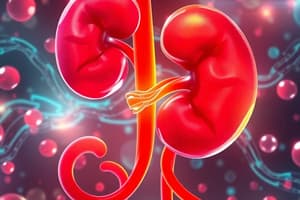Podcast
Questions and Answers
What is the primary mechanism by which diuretics lower blood pressure?
What is the primary mechanism by which diuretics lower blood pressure?
- Increasing peripheral vascular resistance
- Enhancing cardiac output
- Depleting body sodium stores (correct)
- Increasing blood volume
Which of the following is NOT a type of diuretic?
Which of the following is NOT a type of diuretic?
- Calcium channel blockers (correct)
- Loop diuretics
- Potassium-sparing diuretics
- Thiazide diuretics
What is the most common initial drug therapy for hypertension?
What is the most common initial drug therapy for hypertension?
- Potassium-sparing diuretics
- Loop diuretics
- Thiazide diuretics (correct)
- Beta blockers
Thiazide diuretics are ineffective in patients with what condition?
Thiazide diuretics are ineffective in patients with what condition?
What effect do diuretics have on blood volume in patients with hypertension?
What effect do diuretics have on blood volume in patients with hypertension?
Which of the following side effects is associated with thiazide diuretics?
Which of the following side effects is associated with thiazide diuretics?
For how long does the hypotensive effect of diuretics persist during long-term treatment?
For how long does the hypotensive effect of diuretics persist during long-term treatment?
Which of the following diuretics can also be used in patients with impaired kidney function?
Which of the following diuretics can also be used in patients with impaired kidney function?
What is the expected blood pressure reduction from diuretics in most patients?
What is the expected blood pressure reduction from diuretics in most patients?
What should be monitored routinely in patients receiving diuretics?
What should be monitored routinely in patients receiving diuretics?
What condition is associated with thiazides' ineffectiveness?
What condition is associated with thiazides' ineffectiveness?
Which electrolyte disturbance is commonly caused by loop diuretics?
Which electrolyte disturbance is commonly caused by loop diuretics?
What is a potential side effect of spironolactone and eplerenone?
What is a potential side effect of spironolactone and eplerenone?
Which class of diuretics can be used to treat nephrogenic diabetes insipidus?
Which class of diuretics can be used to treat nephrogenic diabetes insipidus?
How do loop diuretics affect renal blood flow?
How do loop diuretics affect renal blood flow?
What adverse effect can result from the use of NSAIDs with thiazide diuretics?
What adverse effect can result from the use of NSAIDs with thiazide diuretics?
Which of the following loop diuretics is known for potentially causing hearing loss?
Which of the following loop diuretics is known for potentially causing hearing loss?
What is a primary action of potassium-sparing diuretics?
What is a primary action of potassium-sparing diuretics?
Flashcards are hidden until you start studying
Study Notes
Types of Diuretics
- Thiazide Diuretics: Include Hydrochlorothiazide, Chlorothiazide, Chlorthalidone, Metolazone, and Indapamide.
- Loop Diuretics: Consist of Furosemide, Torsemide, Bumetanide, and Ethacrynic acid.
- Potassium-Sparing Diuretics: Comprised of Triamterene, Amiloride, Spironolactone, and Eplerenone.
Mechanism of Action
- Diuretics reduce blood volume, leading to lower blood pressure.
- Initial effects include decreased volume and cardiac output, followed by a decline in peripheral vascular resistance over time.
- Sodium retention affects vascular resistance by increasing vessel stiffness, which diuretics can reverse.
Efficacy and Usage
- Effective in lowering blood pressure by 10-15 mmHg in most patients.
- Thiazide diuretics can be first-line treatment unless contraindicated.
- In more severe hypertension, diuretics are combined with sympatholytic and vasodilator medications.
- Regular serum electrolyte monitoring is essential for all diuretic patients.
Thiazide Diuretics
- Effective in initial therapy by enhancing sodium and water excretion, which decreases extracellular volume.
- Long-term usage stabilizes plasma volume but maintains decreased peripheral resistance.
- Ineffective in patients with poor kidney function (eGFR < 30 mL/min/m²); loop diuretics become necessary.
- May induce hypokalemia, hyperuricemia, and in some cases, hyperglycemia and new-onset diabetes.
- Efficacy can be reduced with NSAIDs due to their effect on renal prostaglandins.
Loop Diuretics
- Prompt action in blocking sodium and chloride reabsorption makes them suitable for those with renal impairment.
- Enhance renal blood flow and decrease renal vascular resistance.
- Commonly used in heart failure and edema management rather than for hypertension alone.
- Potential side effects include hypokalemia, hyperuricemia, and possible reversible or permanent hearing loss when paired with ototoxic drugs.
Potassium-Sparing Diuretics
- Amiloride and Triamterene inhibit sodium reabsorption but have mild diuretic effects and can lead to hyperkalemia.
- Spironolactone and Eplerenone combat potassium loss and mitigate cardiac remodeling in heart failure.
- These agents possess antiandrogen properties, which may cause male sexual dysfunction and gynecomastia.
Studying That Suits You
Use AI to generate personalized quizzes and flashcards to suit your learning preferences.




